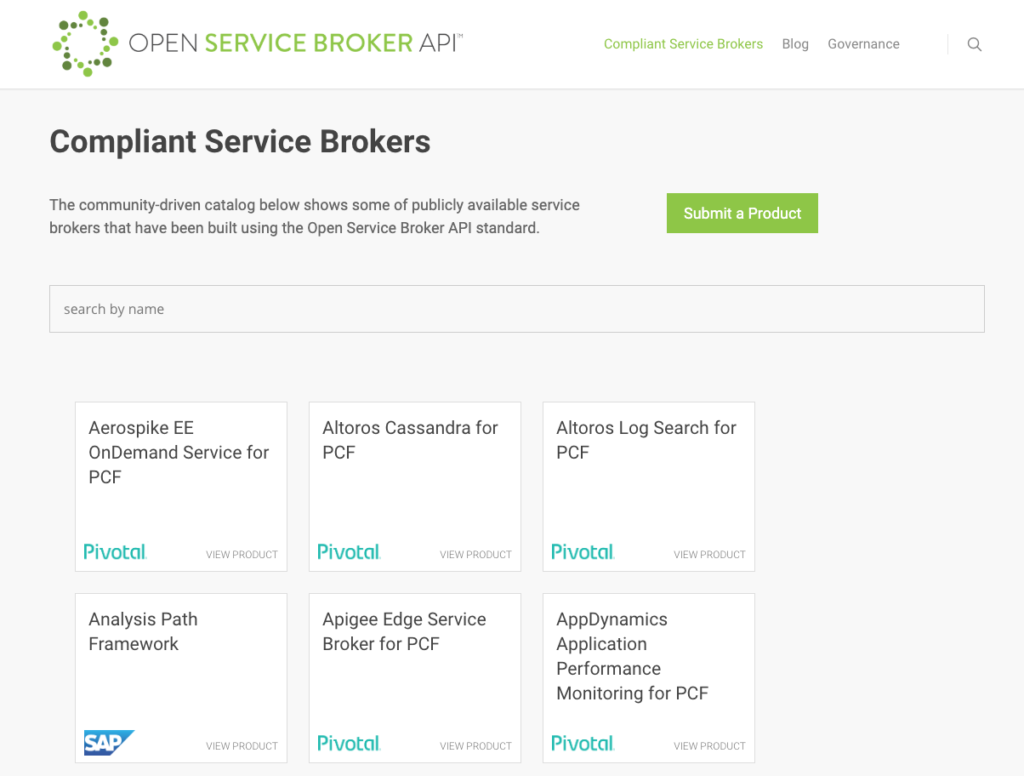Cloud Foundry Foundation opens up governance of Service Broker API, new group aims to incubate the standardization of service delivery across cloud offerings
San Francisco, December 13, 2016 — Cloud Foundry Foundation, in collaboration with individuals representing Fujitsu, Google, IBM, Pivotal, Red Hat and SAP, today announced the launch of the Open Service Broker API project. The Open Service Broker API project allows developers, ISVs and SaaS vendors a single, simple, and elegant way to deliver services to applications running within cloud native offerings including Cloud Foundry, OpenShift and Kubernetes.
Many large companies are already in the process of implementing service brokers including Google, Red Hat and Microsoft. Cloud Native Computing Foundation’s Kubernetes community has a special interest group defining a service catalog that will integrate with the Open Service Broker API.
“Enterprise architectures remain complex,” said Abby Kearns, Executive Director, Cloud Foundry Foundation. “A consistent model for exposing capabilities to developers across the architecture ensures these organizations focus on developing and deploying applications that truly differentiate their business. We are excited to work with key leaders across multiple organizations to continue to develop this capability.”
“As everything from applications to infrastructure is increasingly built from services — services that are importantly run across a variety of environments — integration becomes a critical consideration,” said Stephen O’Grady, Principal Analyst, RedMonk. “Standardized interfaces such as the Open Service Broker API represent a solution to this problem, as reflected in the broad cross-community support it has attracted to date.”
“With the industry move from infrastructure level management to service level management, there’s demand for an open API for service control,” said Jay Judkowitz, Senior Product Manager, Google. “The availability of Cloud Foundry Foundation’s multi-platform, multi-marketplace API is exactly what our customers need and will be a key building block for successful multi-cloud adoption.”
“We consistently hear from cloud developers and ISVs that integration and portability of cloud-native application across platforms is critical to their speed and innovation. The new Open Service Broker API project means that developers will be able to leverage the same services across platforms,” said Todd Moore, VP Open Technology, IBM Cloud. “At IBM, we look forward to our continued work in partnership with Cloud Foundry, Cloud Native Computing Foundation and their ecosystem members to drive integration and portability of cloud-native applications with the new Open Service Broker API.”
“In a digital world, widely adopted and easy-to-use interfaces are the cornerstone of collaboration and interoperability,” said Wolfgang Ries, CMO, Fujitsu Enabling Software Technology. “The Open Service Broker API is an industry-driven, customer-centric, standardization effort aiming to reach these goals. It is a step towards filling the gap that currently exists in the cloud native landscape.”
“Cloud-native applications are built as compositions of services. A key value to this modern design is the ability to focus on the core business-differentiating value of your application while reusing common services, whether internal, platform provided, or third party provided,” said Chris Wright, Vice President and Chief Technologist, Office of Technology, Red Hat. “An open, collaborative incubation effort can provide an Open Service Broker API that gives the industry a standardized way for service providers to make their services available and gives developers an easy way to consume them.”
“Developers build great cloud-native apps thanks to platforms like Cloud Foundry and our rich ecosystem of software partners,” said James Bayer, VP of Product, Cloud Foundry at Pivotal. “The Service Broker API greatly simplifies service interactions for developers, and by having other platforms use this innovation, our customers will benefit from an even larger ecosystem of marketplace providers.”
“As a platinum member of the Cloud Foundry Foundation, we are excited about the launch of the Open Service Broker API project,” said Björn Goerke, President SAP HANA Cloud Platform at SAP SE. “With this industry-wide standardization, we can provide our customers and partners our extensive portfolio of business services through an open API in any supporting cloud platform.”
“By standardizing the industry on the Open Service Broker API, end users of cloud-native application platforms will have the benefits of service catalog interoperability across platforms and an increased growth in adoption by the ISV and cloud provider industry,” said Chip Childers, CTO, Cloud Foundry Foundation. “We have already seen the Kubernetes community begin to adopt the existing Cloud Foundry version of the API, and we look forward to this cross ecosystem collaboration move toward the shared standard.”
The Service Broker API accelerates the expansion of the global cloud ecosystem by providing a single path for developers to add services to applications. Now developers can write and configure against a single API and reach many developers across multiple platforms. For more information on the Open Service Broker API initiative, visit: https://openservicebrokerapi.org//. You can also join the Twitter chat on December 13 at 2pm ET: https://www.crowdchat.net/appserviceschat
About Cloud Foundry Foundation
The Cloud Foundry Foundation is an independent non-profit organization formed to sustain the development, promotion and adoption of Cloud Foundry as the industry standard platform for cloud applications. Cloud Foundry makes it faster and easier to build, test, deploy and scale applications. Cloud Foundry is an Apache 2.0 licensed project available on Github: https://github.com/cloudfoundry. To learn more, visit: http://www.cloudfoundry.org.
###
Red Hat is a trademark of Red Hat, Inc. in the U.S. and other countries.
Contact:
Jessica Rampen
Cloud Foundry Foundation
pr@cloudfoundryfoundation.org
650-787-3548
 Thanks to Brie and the rest of the Cloud Foundry Foundation team for all of their hard work building this! If you have any questions or feature requests, please get in touch with us on Slack.
Thanks to Brie and the rest of the Cloud Foundry Foundation team for all of their hard work building this! If you have any questions or feature requests, please get in touch with us on Slack.



